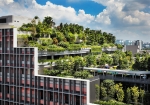World Architecture Festival: the cream of architecture in Amsterdam
>
The 2018 World Architecture Festival in Amsterdam has drawn to a close, naming a slate of overall winners. First held in Barcelona in 2008, the three-day event celebrates projects around the world while raising important issues in the profession.
This year’s theme touched on architectural identity. A jury of over 130 judges—including David Adjaye of Adjaye Associates, Jeanne Gang of Studio Gang, and Rem Koolhaas of OMA—reviewed more than 500 projects from 57 countries, before a jury of five narrowed the list down to 12 overall winners.
The Building of the Year award—the festival’s highest honor—went to Singapore-based WOHA Architects for its work on Kampung Admiralty, a mixed-use retirement village in the firm’s home country, marking the third time the prize has gone to a project from Singapore. London firm WilkinsonEyre previously won the award in 2012 for the Cooled Conservatories at Gardens by the Bay, while OMA and Buro Ole Scheeren were recognized in 2015 for their collaboration on the residential complex The Interlace.
The winner was selected by a “super-jury” of four venerated representatives of the global architectural community—comprising Li Xiadong (Founder and Professor —School of Architecture, Li Xiadong & Atelier Tsinghua); Nathalie de Vries (Director and Co-founder—MVRDV); Frederick Cooper Llosa (Founder and Senior Partner—COOPER, GRANA, NICOLINI, Arquitectos) and Lesley Lokko (Head of Graduate School of Architecture—University of Johannesburg).
The substantial mixed-use building is Singapore’s first integrated public development that brings together a mix of public facilities and services under one roof. The one-stop integrated complex maximises land use and is a prototype for meeting the needs of Singapore’s ageing population. Located on a tight 0.9 Ha site with a height limit of 45m, the scheme builds upon a layered ‘club sandwich’ approach, with a range of commercial, residential and health space amid amenities and community services, topped by extensive green terraces adorning various elevated spaces.
“The judges admired the project for the way in which it dealt with the universal condition of longevity and health treatments, social housing provision, and commercial space, which enabled substantial public realm benefits,” said Paul Finch, Programme Director of the World Architecture Festival. “This hybrid building also incorporates a huge amount of greenery (more than 100% of its footprint) in a series of layered levels which have generated welcome biodiversity. This is a project that does something necessary in an intelligent fashion from the way it connects to transport to its natural ventilation strategy, all benefitting from a decision to layer a series of buildings rather than separating them into separate tall blocks. The jury felt this was a project with potential lessons for cities and countries around the world.”
Paul Finch added “2018 has been our most successful festival to date, and we look forward to returning to Amsterdam this time next year.”
Other overall winners at this year’s festival included:
The Building of the Year award: Kampung Admiralty in Singapore by WOHA Architects
Future Project of the Year: Medellin River Parks / Botanical Park Master Plan in Colombia by Sebastian Monsalve + Juan David Hoyos
Small Project of the Year: Piedras Bayas Beachcamp in Chile by Camilo Moraes
Use of Color Prize: Pálás cinema in Ireland by dePaor
The Amsterdam Prize: North South Line in Amsterdam by Benthem Crouwel Architects
Glass Future Prize: Tour Montparnasse in Paris by Studio Gang
INSIDE World Interior of the Year: Yumin Art Nouveau Collection in South Korea by JAC Studios
Landscape of the Year: Pedestrian path along the Gypsum Mines in Barcelona by Batlle I Roig Arquitectura
Architectural Photography Award: Pawel Paniczko for his images of the Long Museum West Bund in Shanghai by Atelier Deshaus
Use of Certified Timber Prize: International House Sydney in Australia by Tzannes
WAFX Award: Beloit College Powerhouse in Wisconsin by Studio Gang
WAF Research Programme Water Prize: Ciudades Auto-Sostenibles Amazónicas by PUCP and UCL’s Development Planning Unit.













